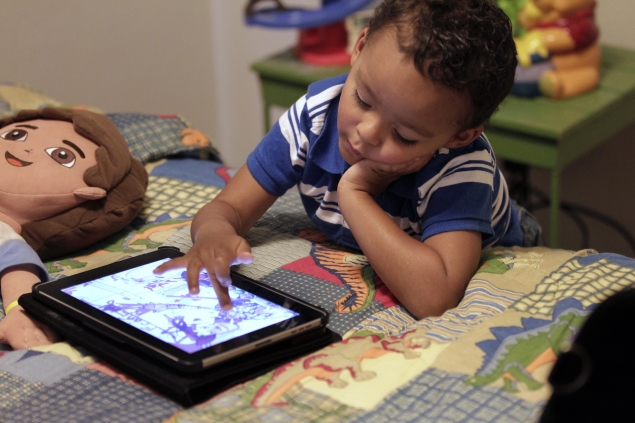- Home
- Tablets
- Tablets News
- Tablets popular with kids, but health experts worry about effects on development
Tablets popular with kids, but health experts worry about effects on development

Susan Linn, director of the Campaign for a Commercial-Free Childhood, says parents should be wary of any TV show or app that touts educational benefits for babies or toddlers, saying that scientists have yet to prove that there are any.
"Babies and young children are spending huge amounts of time with screen media when really what they need is hands-on creative play, active time and face-to face time with the people that love them," Linn said.
Linn's group, known for its allegations against "Baby Einstein" videos that eventually led to consumer refunds, is urging the Federal Trade Commission to examine the marketing practices of certain apps and games geared toward babies.
"The best toys are the ones that just lie there until the child transforms them," Linn said pointing to blocks and stuffed animals as examples. "If all children do is push a button, that's not the kind of play that promotes learning."
Since its debut over 40 years ago, Sesame Street has dealt with questions about the amount of screen time small children should have.
Scott Chambers, Sesame Workshop's senior vice president for digital content, says the brand, which now includes 45 apps and 160 e-books, has gotten a huge boost from touch screen devices, which are much easier for preschoolers to handle than computer mice. That content can provide children with a much more customized and interactive educational experience than the show could hope to deliver, he says.
"It's a balancing act, but all we can do is try to provide a good enriching media experience wherever parents and preschoolers may be," Chambers says.
Chambers notes that some of Sesame's apps encourage kids to put down their devices, pointing to Sesame's new "Family Play" app. Instead of having a child interact directly with a phone or tablet, it gives parents ideas for ways to play together.
Adam Cohen, a stay-at-home father of two from New York, says apps have been a key part of his 5-year-old son Marc's education since he was just a baby.
"He had an iPad at close to 18 months so he was definitely one of those babies swiping away in his stroller," Cohen says. "Now it's different, but back then we were a little ostracized. Now he's reading at close to a second-grade reading level and I credit a lot of that to iPad apps."
Marc now has his own iPad loaded with mostly educational content and his baby sister Harper, who isn't yet one-year-old, seems frustrated that she doesn't have one too, Cohen says.
Still, not every parent is keen on tablets and apps.
Lance Somerfeld, another stay-at-home dad from New York, says he thinks he and his wife are stricter than most parents. They don't own a tablet and didn't allow their 5-year-old son Jake to watch TV until he was nearly three. But Somerfeld says he does have an iPhone and lets Jake occasionally play with some of the apps.
"If I have an hour and a choice, I'd really rather spend it reading books with him," Somerfeld says. "But he's really engaged by the apps, so you could make the case that there needs to be a balance."
Catch the latest from the Consumer Electronics Show on Gadgets 360, at our CES 2025 hub.
Related Stories
- Samsung Galaxy Unpacked 2025
- ChatGPT
- Redmi Note 14 Pro+
- iPhone 16
- Apple Vision Pro
- Oneplus 12
- OnePlus Nord CE 3 Lite 5G
- iPhone 13
- Xiaomi 14 Pro
- Oppo Find N3
- Tecno Spark Go (2023)
- Realme V30
- Best Phones Under 25000
- Samsung Galaxy S24 Series
- Cryptocurrency
- iQoo 12
- Samsung Galaxy S24 Ultra
- Giottus
- Samsung Galaxy Z Flip 5
- Apple 'Scary Fast'
- Housefull 5
- GoPro Hero 12 Black Review
- Invincible Season 2
- JioGlass
- HD Ready TV
- Laptop Under 50000
- Smartwatch Under 10000
- Latest Mobile Phones
- Compare Phones
- Huawei Nova 13i
- Itel A80
- HMD Key
- Redmi Turbo 4
- Vivo Y200+
- Lava Yuva 2 5G
- OnePlus Ace 5
- OnePlus Ace 5 Pro
- Asus Zenbook S 14
- MacBook Pro 16-inch (M4 Max, 2024)
- Honor Pad X9 Pro
- Honor Pad V9
- boAt Enigma Gem
- boAt Enigma Daze
- Sony 65 Inches Ultra HD (4K) LED Smart TV (KD-65X74L)
- TCL 55 Inches Ultra HD (4K) LED Smart TV (55C61B)
- Sony PlayStation 5 Pro
- Sony PlayStation 5 Slim Digital Edition
- Blue Star 1.5 Ton 3 Star Inverter Split AC (IC318DNUHC)
- Blue Star 1.5 Ton 3 Star Inverter Split AC (IA318VKU)

















